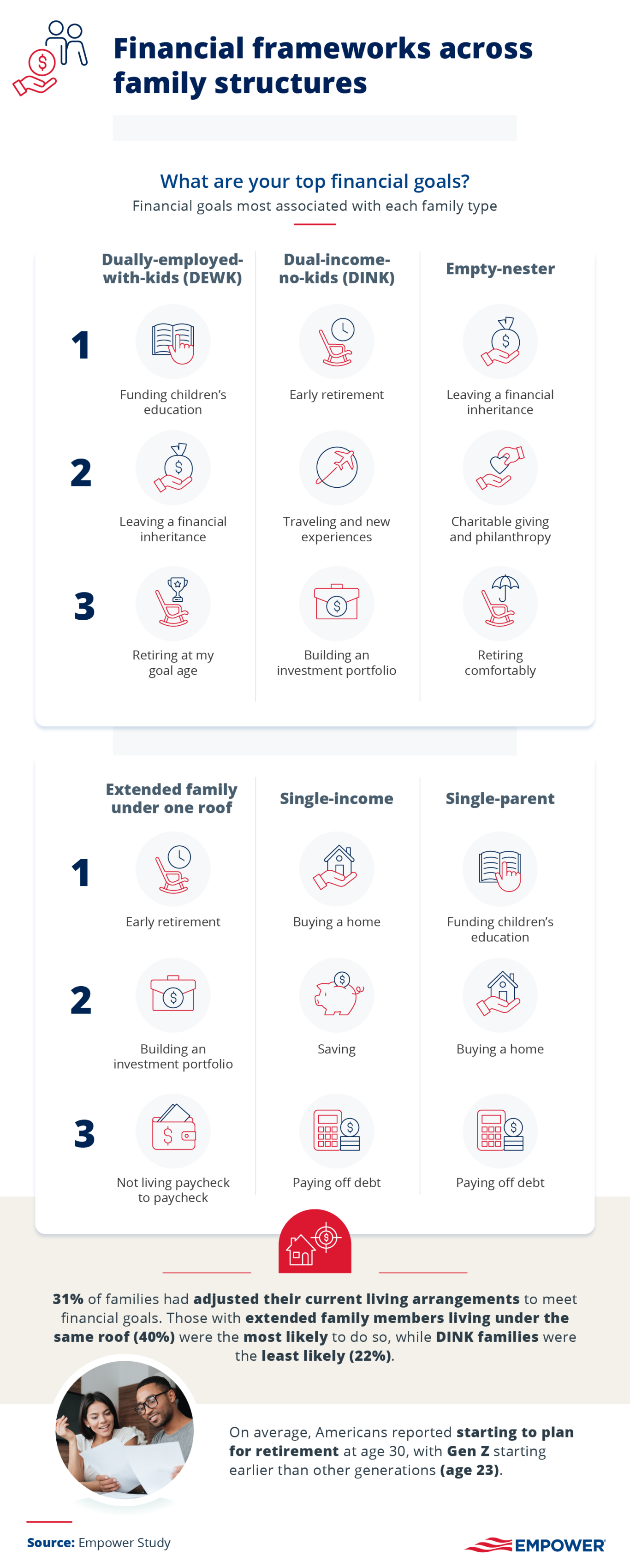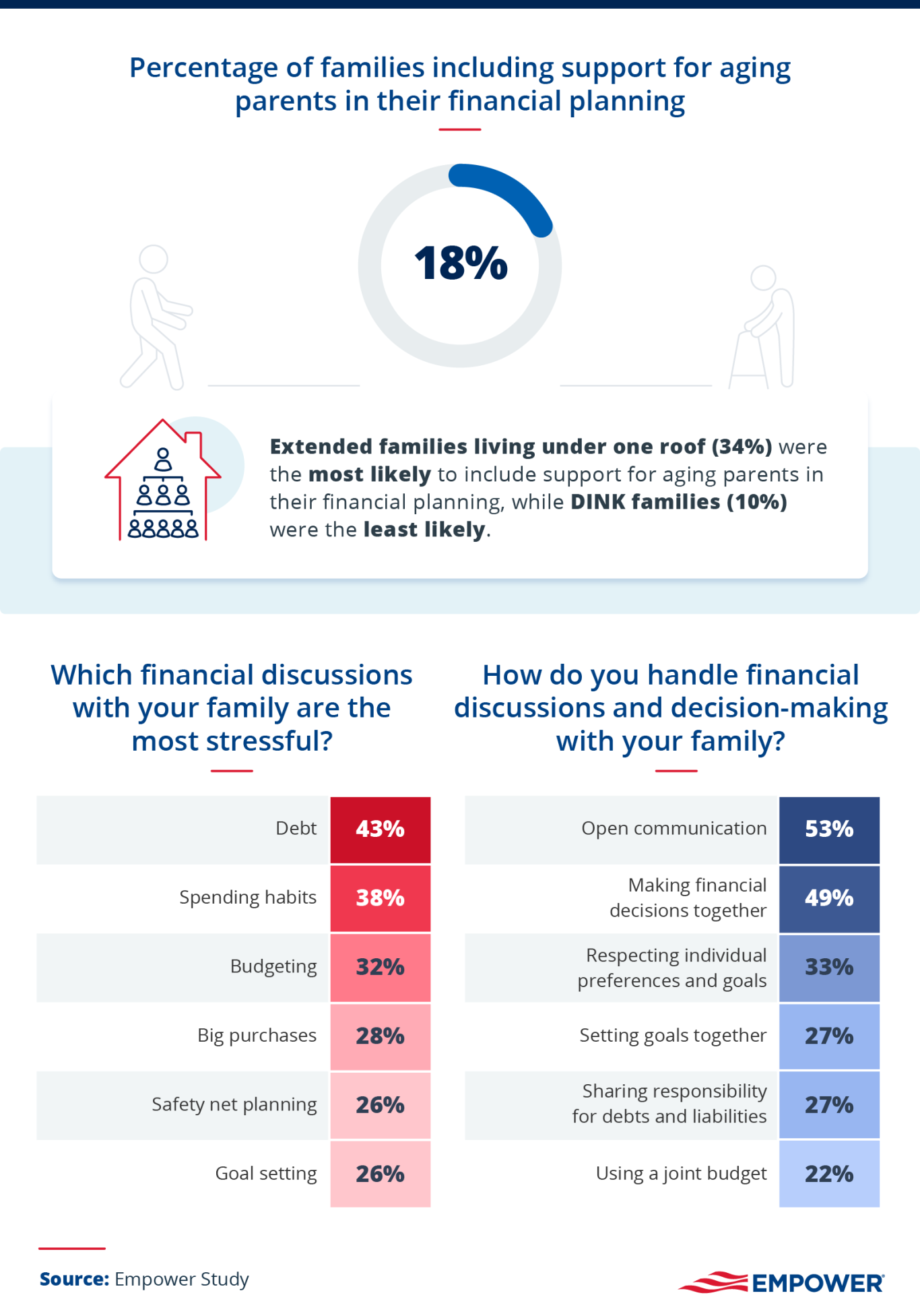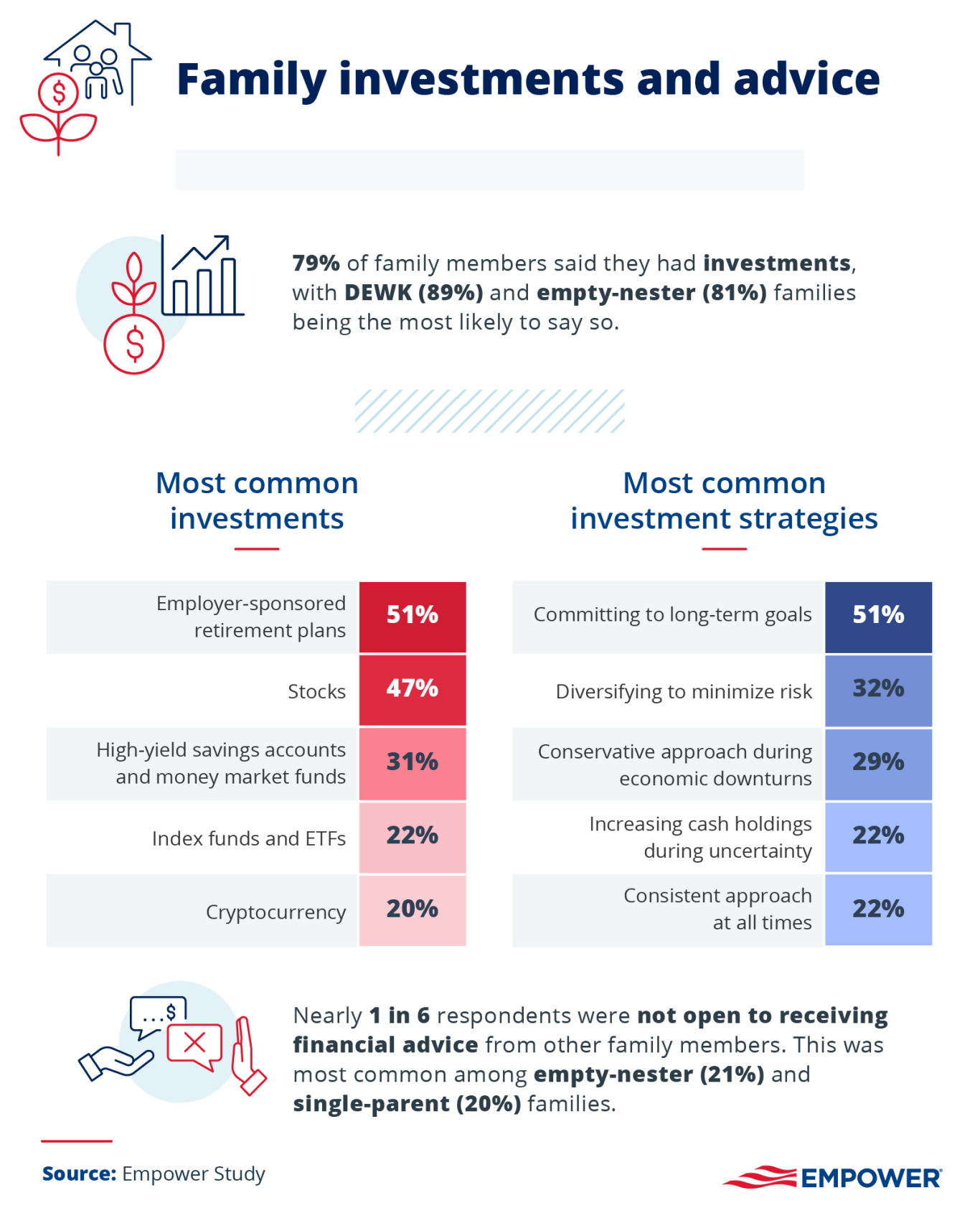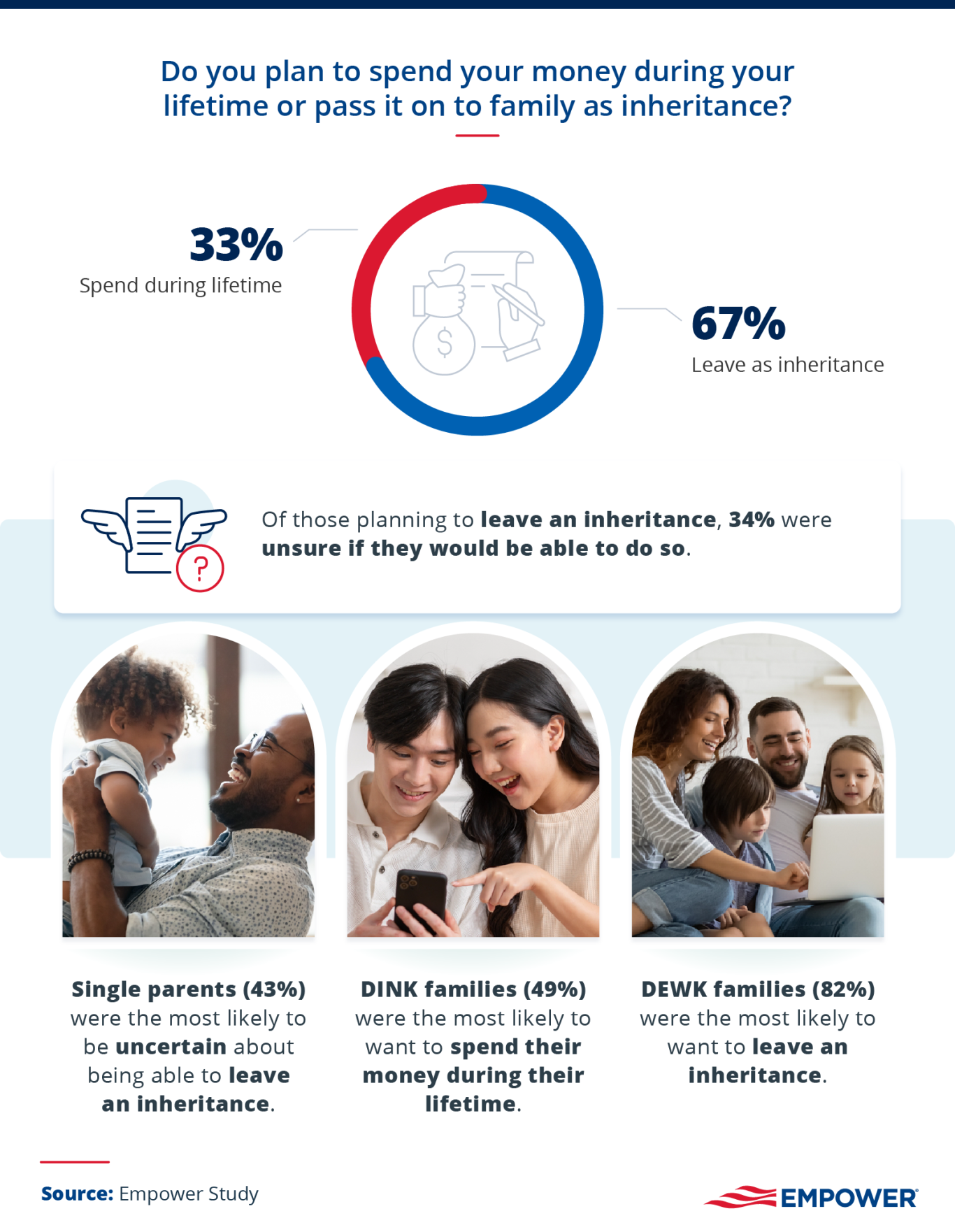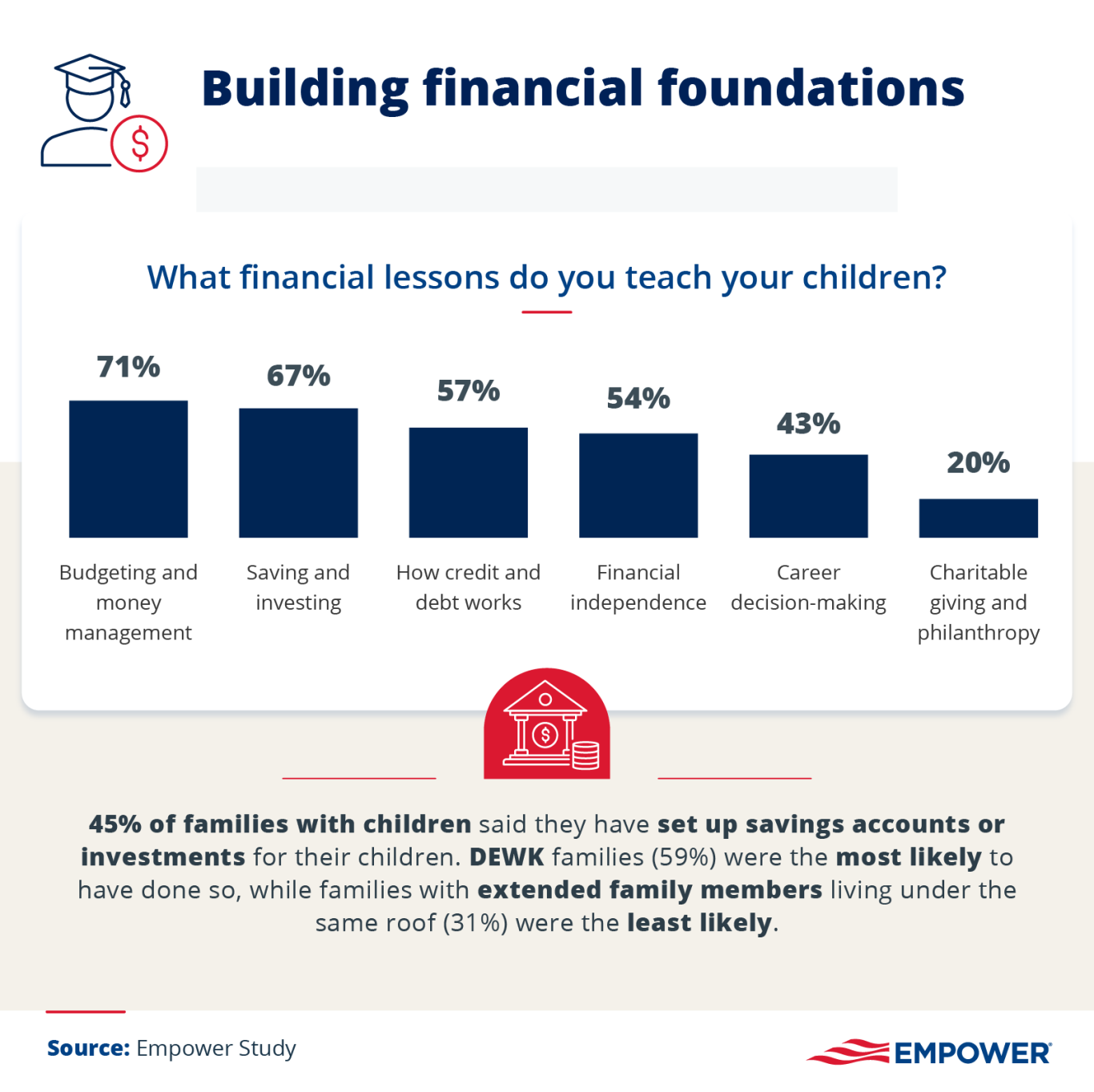Family finances: Navigating money matters across generations

Each generation has different money perceptions: how to save it, where to spend it, what to invest in. To dive deeper into how families navigate their financial plans and goals together, Empower surveyed 1,007 Americans about their spending and saving habits. Respondents included members from six family types:
- Single-income
- Single-parent
- Dually-employed with kids (DEWK)
- Dual-income, no kids (DINK)
- Empty-nester
- Extended families living under one roof
The importance of open financial dialogue and joint decision-making within families is evident, with a strong desire to prepare future generations with more education around money.
Key takeaways
- 67% of families say they want to leave an inheritance, but more than a third (34%) are unsure if they’ll be able to.
- 30% of families say they have a joint bank account vs. keeping finances separate.
- Nearly 1 in 6 families are not open to receiving financial advice from other family members.
- On average, Americans start planning for retirement at age 30. Gen Z starts earlier than other generations, at age 23.
- Only 18% of families include support for aging parents in their financial planning; Gen Zers are starting earlier with nearly a quarter (21%) already thinking ahead and doing so.
Talking about money: A family affair
Talking it out when it comes to money can be a bit uncomfortable, especially among family members. When it comes to financial discussions, Gen Z is most likely to say budget conversations are the most stressful (43%) to have as a family, while baby boomers find safety net planning the most challenging to talk about (34%). Millennials, a generation uniquely impacted by economic challenges, have a different pressure point: 48% feel the most strain when discussing debt.
Different family structures take varied approaches to financial management. DEWK families are the most open about financial communication (62%) and stand out when it comes to collaborative goal-setting: 39% have joint financial objectives. DINK and DEWK families are equally likely (57%) to make financial decisions together.
When asked about their savings habits, 30% of families say they have a joint bank account vs. keeping finances separate. Driven by a shared ambition to achieve financial goals, 31% of families have reshaped their living arrangements to manage expenses, whether by sharing their home, downsizing, or relocating. Respondents living with extended family in the same home are the most likely to report having done so.
Retirement readiness
Retirement goals vary among families, and generational differences in financial planning also emerged. On average, Americans say they begin planning for retirement at age 30, but Gen Z says they start much sooner, at age 23. Gen Zers’ early start on retirement savings points to their focus on financial goals to enjoy life in the here and now, while being able to retire comfortably.
Family portfolios and planning
The survey reveals a strong inclination toward investing, with 79% of family members confirming they hold investments of some kind. DEWK and empty-nester families lead the pack, with 89% and 81% actively engaged in investment activities, respectively.
DINK families tend to invest their money in high-yield savings accounts and money market funds (43%) while DEWK families prefer employer-sponsored retirement plans (69%). Single-parent families are the most likely not to hold any investments (31%). Regardless of investment preferences, nearly 16% of respondents expressed reluctance to accept financial advice from their family members.
When it comes to planning, only 18% of families have factored support for aging parents into their financial strategies. Extended families living together are the most likely to include this in their planning (34%), while DINK families are the least likely (10%). The youngest generation is shifting their approach: Almost one-quarter of Gen Zers (21%) are already thinking ahead and incorporating support for aging parents into their financial planning.
Whether or not they take financial advice from family, many respondents would prefer to hand down some of their assets: 67% of families said they want to leave an inheritance, yet more than a third (34%) were unsure they could do so. This uncertainty is most pronounced among single parents, 43% of whom doubted they would be able to leave any finances or assets behind.
Legacies for the next generation
Imparting financial wisdom to children can be an important part of family financial planning. A significant 71% of families prioritize teaching their kids budgeting and money management skills, helping to lay a strong foundation of financial literacy from a young age. More than two thirds (67%) emphasize the importance of saving and investing.
Understanding credit and debt is another key lesson, with 57% of families including this conversation in their money talks. Nearly half of families with children (45%) set up savings accounts or investments for their kids, with DEWK families being the most likely to do so at 59%.
Career guidance is another area where family influence is evident: When given the choice, more families advocate for their children to start a career that aligns with their skill set (59%) vs. a job they'll love (52%). Stable career choices are a priority for 36% of those surveyed, and having a career backup plan is advised by 33%.
Family financial goals
Financial planning approaches are as diverse as families themselves, from Gen Z’s proactive stance on retirement planning to the families changing their living situations in order to meet financial goals. Having a strategic plan can help families prepare for life’s challenges and instill good money habits for future generations.
Get financially happy
Put your money to work for life and play
Methodology
Empower survey of 1,007 Americans to explore their financial goals and communication dynamics concerning financial planning within their family units. Respondents’ family structures were distributed as follows:
- Single-income: 29%
- Dually-employed-with-kids (DEWK): 23%
- Dual-income-no-kids (DINK): 19%
- Empty-nester: 11%
- Extended families under the same roof: 11%
- Single-parent: 7%
About Empower
Empower is a financial services company on a mission to empower financial freedom for all. We offer investment, wealth management, and retirement solutions for individuals and all sizes of organizations. Connect with us on Empower.com.
Fair use statement
You’re invited to share our insights with your readers for non-commercial purposes. Please include a link back to this page to provide full access to our findings and methodologies.
RO3276726-1223
The content contained in this blog post is intended for general informational purposes only and is not meant to constitute legal, tax, accounting or investment advice. You should consult a qualified legal or tax professional regarding your specific situation. No part of this blog, nor the links contained therein is a solicitation or offer to sell securities. Compensation for freelance contributions not to exceed $1,250. Third-party data is obtained from sources believed to be reliable; however, Empower cannot guarantee the accuracy, timeliness, completeness or fitness of this data for any particular purpose. Third-party links are provided solely as a convenience and do not imply an affiliation, endorsement or approval by Empower of the contents on such third-party websites. This article is based on current events, research, and developments at the time of publication, which may change over time.
Certain sections of this blog may contain forward-looking statements that are based on our reasonable expectations, estimates, projections and assumptions. Past performance is not a guarantee of future return, nor is it indicative of future performance. Investing involves risk. The value of your investment will fluctuate and you may lose money.
Certified Financial Planner Board of Standards Inc. (CFP Board) owns the certification marks CFP®, CERTIFIED FINANCIAL PLANNER™, CFP® (with plaque design), and CFP® (with flame design) in the U.S., which it authorizes use of by individuals who successfully complete CFP Board's initial and ongoing certification requirements.


